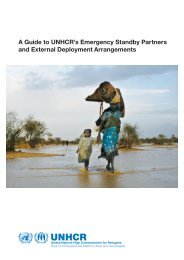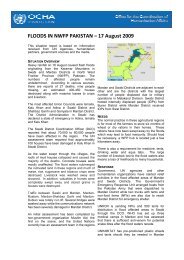Women, Girls, Boys and men - HumanitarianInfo.org
Women, Girls, Boys and men - HumanitarianInfo.org
Women, Girls, Boys and men - HumanitarianInfo.org
Create successful ePaper yourself
Turn your PDF publications into a flip-book with our unique Google optimized e-Paper software.
BASicS<br />
0<br />
I A s c g e n D e r h A n D b o o k<br />
Analyse: Analyse the impact of the humanitarian crisis on wo<strong>men</strong>, girls, boys <strong>and</strong> <strong>men</strong>. Be certain, for example, that all<br />
needs assess<strong>men</strong>ts include gender issues in the information gathering <strong>and</strong> analysis phases, <strong>and</strong> that wo<strong>men</strong>, girls, boys<br />
<strong>and</strong> <strong>men</strong> are consulted in assess<strong>men</strong>t, monitoring <strong>and</strong> evaluation processes.<br />
sAmple ActIvItIes sAmple InDIcAtors<br />
a gender analysis report is prepared to inform programming. Gender analysis report for ituri district prepared by february 2007.<br />
Consultations are conducted with equal numbers of wo<strong>men</strong> <strong>and</strong> <strong>men</strong><br />
to learn about both groups’ needs <strong>and</strong> capabilities.<br />
T H e b A S I C S o n G e n d e R I n e m e R G e n C I e S<br />
50% of the people consulted for the establish<strong>men</strong>t of a health clinic<br />
in Bunia are wo<strong>men</strong>.<br />
design Services: Design services to meet the needs of wo<strong>men</strong> <strong>and</strong> <strong>men</strong> equally. Each sector should review the way they<br />
work <strong>and</strong> make sure wo<strong>men</strong> <strong>and</strong> <strong>men</strong> can benefit equally from the services, for example there are separate latrines for<br />
wo<strong>men</strong> <strong>and</strong> <strong>men</strong>; hours for trainings, food or non-food items distribution are set so that everyone can attend, etc.<br />
sAmple ActIvItIes sAmple InDIcAtors<br />
50 kg rice bags are repackaged into 25 kg bags to make them easier<br />
to transport home.<br />
health centre opening hours are changed to ensure access for <strong>men</strong><br />
working long hours.<br />
sAmple ActIvItIes sAmple InDIcAtors<br />
spot checks are carried out to assess wo<strong>men</strong>’s, girls’, boys’ <strong>and</strong> <strong>men</strong>’s<br />
access to services.<br />
100% of rice bags distributed in Badghis province in January 2007 are<br />
repackaged into 25 kg units.<br />
100% of health centres in ampara district extend opening hours by 2<br />
hours by august 2007.<br />
Ensure access: Make sure that wo<strong>men</strong> <strong>and</strong> <strong>men</strong> can access services equally. Sectors should continuously monitor who is<br />
using the services <strong>and</strong> consult with the community to ensure all are accessing the service.<br />
discussion groups are conducted to assess wo<strong>men</strong>’s, girls’, boys’ <strong>and</strong><br />
<strong>men</strong>’s access to services.<br />
6 spot checks are carried out at the Butterfly Garden pre-school in<br />
Gulu in 2006.<br />
3 discussion groups are convened with boys aged 12-18 from Kitgum<br />
in the first quarter of 2008.<br />
Ensure participation: Ensure wo<strong>men</strong>, girls, boys <strong>and</strong> <strong>men</strong> participate equally in the design, imple<strong>men</strong>tation, monitoring<br />
<strong>and</strong> evaluation of humanitarian response, <strong>and</strong> that wo<strong>men</strong> are in decision-making positions. If it is problematic to have<br />
wo<strong>men</strong> in committees, put in place mechanisms to ensure their voices are brought to the committees.<br />
sAmple ActIvItIes sAmple InDIcAtors<br />
the local shelter committee consists of an equal number of wo<strong>men</strong><br />
<strong>and</strong> <strong>men</strong>.<br />
meetings are held in the idp camp to allow wo<strong>men</strong> to attend without<br />
leaving their children.<br />
50% of members on the local shelter committee in akkaraipattu idp<br />
camp B are wo<strong>men</strong>.<br />
percentage of shelter committee meetings conducted in akkaraipattu<br />
idp camp B in 2007.<br />
Train: Ensure that wo<strong>men</strong> <strong>and</strong> <strong>men</strong> benefit equally from training or other capacity building initiatives offered by the<br />
sector actors. Make certain that wo<strong>men</strong> <strong>and</strong> <strong>men</strong> have equal opportunities for capacity building <strong>and</strong> training, including<br />
opportunities for work or employ<strong>men</strong>t.<br />
sAmple ActIvItIes sAmple InDIcAtors<br />
first aid training is conducted for an equal number of wo<strong>men</strong> <strong>and</strong><br />
<strong>men</strong>.<br />
equal numbers of wo<strong>men</strong> <strong>and</strong> <strong>men</strong> are employed in the food distribution<br />
programme.<br />
50% of invitees to the october 2008 first aid training are wo<strong>men</strong>.<br />
50% of people employed in the food distribution programme in<br />
thauoa in 2005 are wo<strong>men</strong>.











